This week in our interview series we speak with the writers of Weekly OSM, a blog that summarizes what is happening in OpenStreetMap.
One of the challenges of a global movement like OSM is that so many people are doing so many interesting things it can be a real challenge to keep up. If you are not yet a reader you should be.
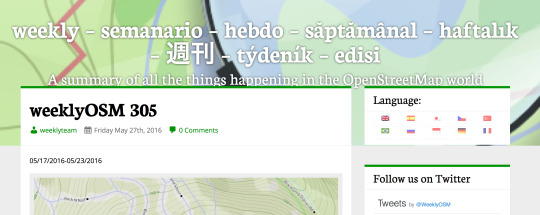
1. Who are you? What do you do?
We are a bunch of volunteers and OpenStreetMap enthusiasts with the aim to support and advertise OSM and we would like to help to keep track in a barrage of information, the project produces every week. With our project Wochennotiz and weeklyOSM we’re trying to inform our fellow community with news about OpenStreetMap in currently five different languages. We’re up to 25 people working, though a bit less than 10 people are actively working and contributing plus three for each supported language.
WeeklyOSM is currently produced in:
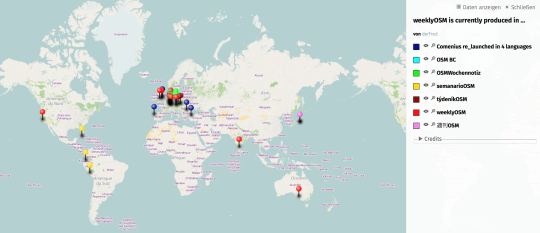
2. What is the OSM Wochennotiz / WeeklyOSM? What is the goal of the project?
The OSM Wochennotiz is a project that was started about 6 years ago (July, 23th 2010 to be exact) by Marc Gehling, who’s still part of our team. Back then and now, the Wochennotiz is a collection of news that might be interesting to OpenStreetMap mappers and enthusiasts. We publish one issue each week and try to collect all relevant information for that. Originally, the OSM Wochennotiz was solely German, although we also did link to anglophone news. However, as the project grew and as we saw the huge interest in our news aggregation results, we decided to expand to other languages as well. Manfred, one of our longest and most diligent contributor is the driving force behind that and as “Wochennotiz” is a German word, we decided to call the international version the “weeklyOSM” to honor as well the great job Pascal Neis and Dennis Zielstra did until July 2014. Manfred and his team re-launched weeklyOSM within a Comenius school project on September 30 2014 with the help of students and teachers from UK, Spain, Romania and Turkey. We’re international, there’s not only an English version but currently also features a Spanish, Japanese and a Czech version. We had other languages as well, but it’s hard to keep people committed to such a time consuming project, as it means you have to steadily collect, write the article (research the background), translate, proofread and publish - every week. That being said, we’re always looking for volunteers with a journalistic vein. :-) Either helping with existing languages or by starting and translating into other languages to improve our news blog. Currently we’re really lacking correspondents in Africa.
Our main goal is to report about news that is relevant to OpenStreetMap. This may be discussions about tagging schemes, events, imports, new OSM related projects and software, anything else where the OpenStreetMap community is concerned and many more. But this also includes reports about companies or projects that switch to OpenStreetMap data, Open-Data and other things that are related to GIS. However, for the latter we try to limit it to things we think are of interest to a majority of our readers.
As most of our information arises from the OSM wiki, OSM mailing lists or forums one might argue, that you can inform yourself without the need for the Wochennotiz/weeklyOSM. Because there are so many sources of information, it’s hard to keep up with everything and we split the task of collecting information ourselves. This includes way more than 20 OSM related mailing lists, changes to the Wiki, OSM Help, the most active forum parts, different blogs, the OSM user diaries, Twitter and so on. The most common feedback we get is that even very active community members find interesting links and information that they weren’t aware of yet.
3. What is the process each week? How do you decide what is relevant? Can/should people submit things?
One of our team members, Christoph aka TheFive wrote a nifty tool for us that aids us in the process of generating our weekly news. The process however has stayed much the same over the years, except that we now have that great tool, a content management system called OSMBC (OpenStreetMap Blog Collector) to support our work. It especially allows now a much easier internationalization. OSMBC was written to fulfill two aims: all languages with equal rights and to allow simultaneous and not consecutive translation, so that all languages can be published at once. The source is - of course - available on github.
Anyways, the process is easily explained: Whenever one of us reads about news that seems interesting, they collect that news in OSMBC. I.e. the link is collected and a short notice (preferably in English) is added to it. Depending on the news’ date, it’s collected for the current or for the next edition. OSMBC as a dedicated content management system for our needs gives the whole group the opportunity to decide about the relevance of each article and to vote an article in or out.
After collecting a link, every item gets a descriptive text which tries to recap what the reader is expect to see. And once a new week ends, we take all of our news items and put them up onto our Wordpress site.
There are some aspects that might be interesting to explain in more detail. You already asked yourself how we decide what is relevant and what not. This is mainly up to each individual contributor and our railway-maniac will always consider railway related news more relevant than others do. But still, we discuss such things. Our OSMBC tool supports a way to comment on single news entries but we also use slack for real time chat. Whenever there is an item that’s not relevant or the description is not what someone else expects, we discuss that and depending on the outcome the item will be changed. I.e. OSMBC allows us to make a virtual conference about each article. Similarly we have a rule to proofread every edition by at least three different people. In this process it happens that we delete an article or move it to our next edition to give it some more work. We try to fulfil our quality standards with that.
As we only link to other news and don’t produce content ourselves, much of our work consists of summarizing content. This means you have to read an article attentively and write a concise message about it. As Blaise Pascal put it “I have only made this letter longer because I have not had the time to make it shorter”, our review process often includes shortening the description and you probably can judge by that how many time we spent on an edition :-) I think this also answers your next question: Yes, we love it when people submit things. We can’t read every news source and it sometimes happens that we miss a news item even from our regular sources. But if you do submit news, we feel even happier if you also add a small summary ;-)
4. There is now weeklyOSM for quite a few different languages. What is the process to add a new language? What should someone considering doing this for their language be aware of?
Well, technically this is a very easy process as we now have our dedicated OSMBC tool. We tell our lead developer to e.g. add Klingon as a new language and with one click it’s done. The tool then allows you to see the list of collected items for this week’s edition with a bunch of ways to filter that list.
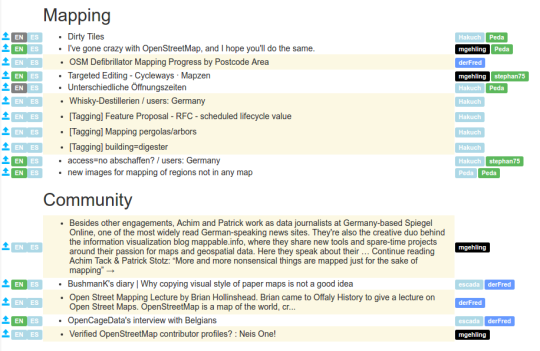
Now if you edit an item, you get an input mask for the item’s description and you can start to write your Klingon text. As we don’t want to make everyone read the news again, we try to start with a short English description while collecting a news item, and we try to start with the English description, too.
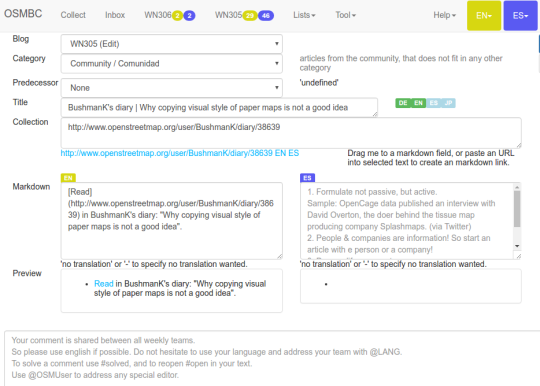
So if you do not only speak Klingon but also English, you have a text to start with, that you just need to translate. And if you think the news is not relevant for your readers (e.g. news about a German city for Japanese readers) you can annotate it as not relevant for your language. OSMBC features a bunch of really cool options, filters and tools to aid in translation and internationalization. And whenever you’re ready, you can make OSMBC export the list of news for your language to HTML code to add it into Wordpress or wherever else. This process and OSMBC helps to get all language’s editions to be published at the same time and not with a delay of some days.
5. How do you collaborate/communicate in the different teams?
As we kind of need a common language to collaborate, someone who wants to add their language should not only fluently speak that language but also understand English. However, the dictionary is your friend in case of problems :-) and only the native English speakers speak a correct English. ;-) The main communication at the moment is via slack channel, but a FOSS solution is on the way.
What you should not underestimate though is the amount of work and time this takes and you should plan to spend at least 2-3 hours per week if you keep the work to a absolute minimum. And as we publish one edition every week, you may never go into holidays or be ill! ;-) Joking apart, committing oneself to such a task is really hard. So you probably should try to search for at least two other people to help or you stick with the English posts whenever you did not make it to translate some posts or didn’t have time the whole week. That being said, we’re not forced to release every version simultaneously. I.e. it happens quite often that the German version got released and the Czech version still takes some hours until it’s ready. We’re also not cross with you, if you decide that the Klingon translation is to hard to keep it running. At least you gave it a try! The team will give you any support you need.
6. What are the plans for the future?
There are no big plans: We want keep up our continuous and hopefully good and beloved work ;D We’re searching for more volunteers to help collecting, writing and translating our news. We would like to reactivate languages that were once a part of weeklyOSM, like French, Russian, Bahasa Indonesia and Portuguese or welcome new languages to spread the OSM news in every OSM community.
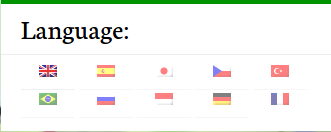
Furthermore, we’re trying to increase our quality and are in the process of initiating an irregular editorial meeting. And we’re always trying to expand, as we think we still do not cover every important language. E.g. French, Russian, Portuguese, Indonesian are large communities that are important, too and should be added as a language of choice. Not only for translations but also for interesting news that are not covered yet.
7. How can people who want to help get involved?
If you want to submit a news item or if you want to join our team, write a mail to our blog’s mailing lists blog at openstreetmap dot de or theweeklyosm at gmail dot com. If you want to start a new language’s version or want to help in translating, you may also write to Manfred via theweeklyosm at gmail dot com, who’s mainly managing the translation teams.
8. Our final, traditional question: In 2014 OSM celebrated its 10th birthday. Where do you think the project will be in 10 years time?
The project will be even greater than it is today! We will have covered news about every street in the world mapped, we will have linked to other news that report about the financial problems of TomTom and HERE and we have problems making our planet files available to everyone due to the file’s size. In summary, we will have reached what many great OpenSource and OpenData projects have reached: We got mainstream and the companies that laughed at us ceased to exist.
Beyond the project, its mappers and the tools will change. While it is still common today that you go out and collect address data, street data or even add missing rivers to the database, this probably won’t be the case in 10 years as we’re finished with that. But we need new means to keep our data up-to-date and to add the details to our map. Thus, there will grow new tools to aid mappers with that and the work mappers do will continuously change from collector to validator tasks.
Many thanks WeeklyOSM team! It’s a great resource that I urge everyone to take advantage of. Hopefully this interview will encourage more volunteers to join the team.
thanks,
You can see all the Open Geo interviews here. If you are or know of someone we should interview, please get in touch, we’re always looking to promote people doing interesting things with open geo data.